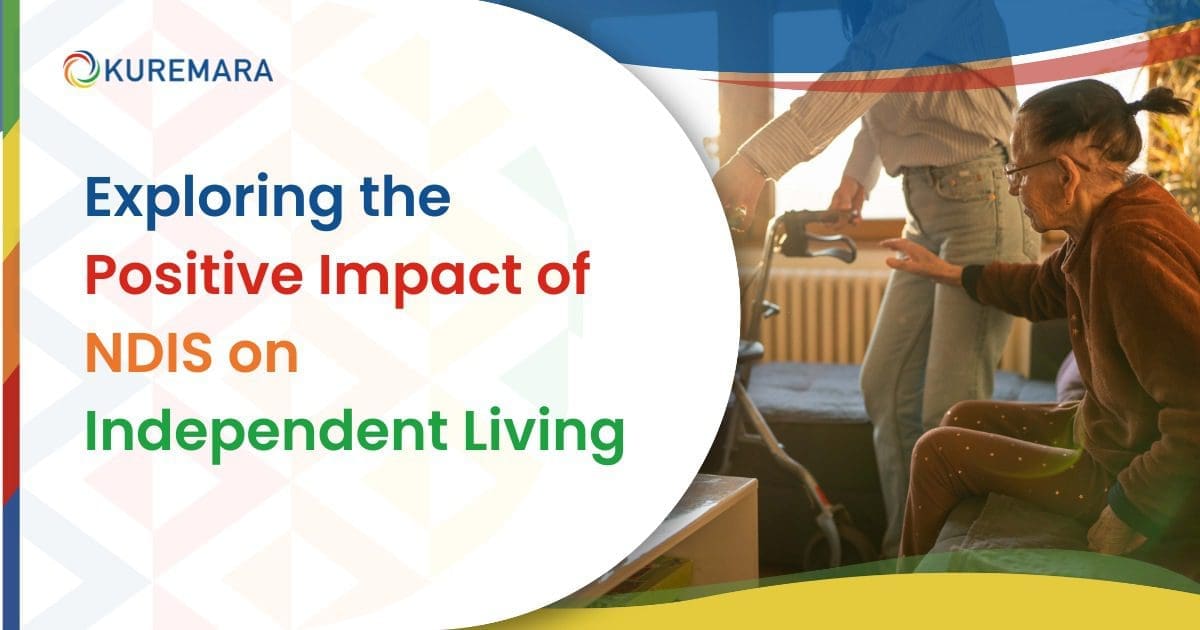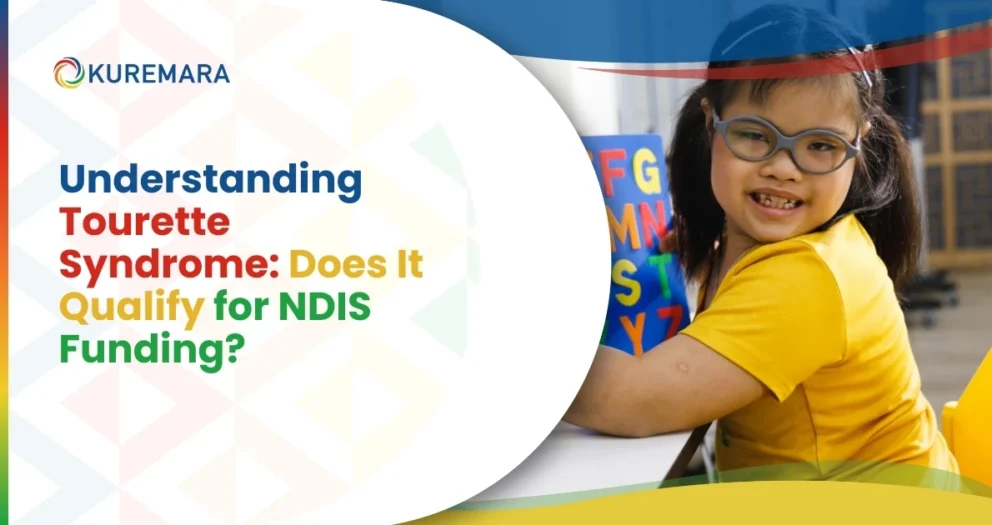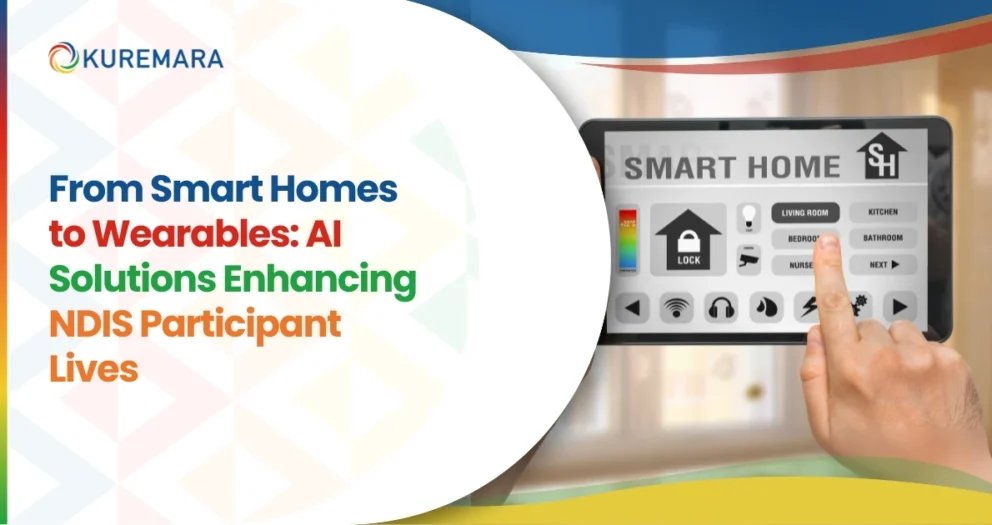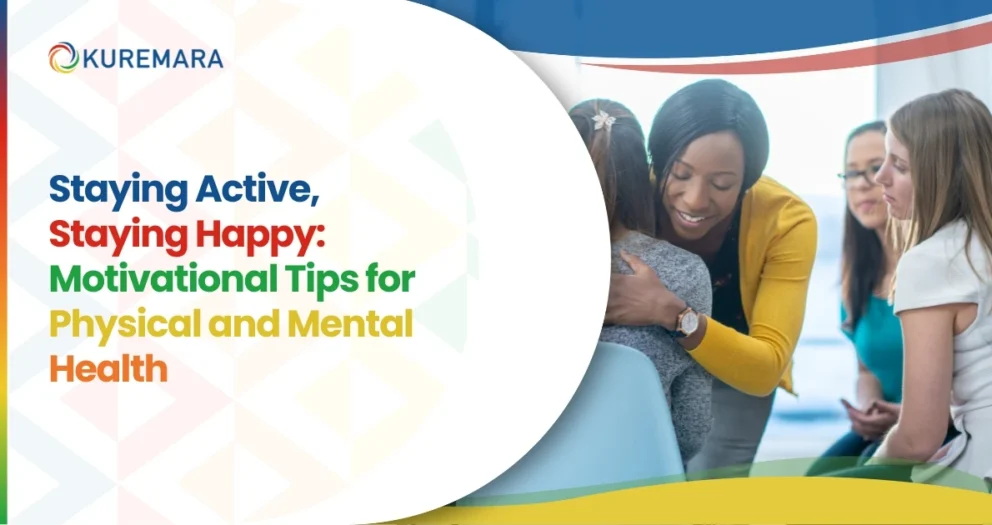Thousands of Australians with disabilities have undergone a game changer under the scheme of the NDIS: resource and support to aid completely independent living. To empower the people, such as those through the services offered in NDIS supported independent living (SIL) and NDIS housing, participants will be empowered with the skills and self-confidence needed to manage daily tasks, thus living fulfilled lives. The personalisation of the program ensures that every participant receives a plan tailored to their specific needs and goals.
Through close collaboration with the registered NDIS provider, Kuremara enables individuals to maximise the potential of their support, gaining a sense of more independence and participation in community activities. The following article explores how the NDIS improves independent living through its provision of fundamental housing solutions to participants for the improvement of life skills. And we shall share very practical tips that make great use of your NDIS support to allow for a much higher quality of life and long-term independence.
Understanding NDIS and Independent Living
What Is NDIS?
The NDIS is the Australian government-funded scheme, which has been designed to assist individuals suffering with permanent and quite severe disabilities. It works by supporting the disabled people participating to give them access to the care and all resources they need to lead a more independent life. The scheme adopts a participant-centered approach to support planning, in which support plans are uniquely focused on the needs and goals of a person, and their strengths are highlighted with an aim to achieve independence and personal development.
What Is NDIS Supported Independent Living?
Under NDIS Supported Independent Living, participants are helped to live independently with the support they may require through staying in their own home or shared accommodation. It often entails help by cooking, cleaning, personal care, and managing other household chores. The SIL delivers the assistance in gaining skills and confidence for the individuals to help them become self-dependent, although at the same time still provided with support which is necessary to take proper care of one’s own wellbeing and safety.
The Role of Registered NDIS Providers
Registered providers play a significant role in providing quality and personalised services to the participants of NDIS. Providers are accredited and registered according to the NDIS standards. They provide enough options of support that include SIL, NDIS housing, and community participation programs. By choosing an NDIS-registered provider, participants can ensure that they receive consistent and reliable and compliant care.
The Positive Impact of NDIS on Independent Living
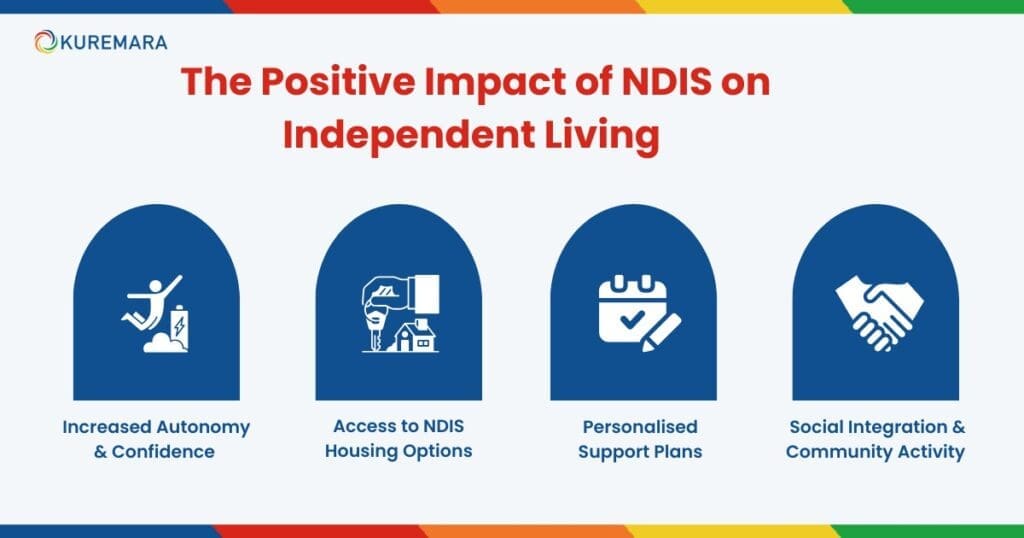
Increased Autonomy and Confidence
One of the most significant impacts of NDIS support is the increase in autonomy it provides to participants. With access to supported independent living services, individuals with disabilities can take control of their daily lives, from managing personal care routines to making decisions about their living arrangements. This autonomy not only improves their quality of life but also boosts their confidence and sense of self-reliance.
Participation in the NDIS will give individuals an opportunity to learn practical life skills to lead independent lives. It can enable them to learn how to manage personal funds, prepare meals, clean houses, and navigate public transportation. As they grow in these skills, they become increasingly capable of managing their own affairs with less reliance on others as they grow in independence.
Access to NDIS Housing Options
NDIS housing options also contribute to the promotion of independent living. Participants can exercise choices over the different types of dwellings available – including private homes, shared accommodation, and specific accessibility-related housing solutions. All the above NDIS housing solutions afford participants a safe and supportive environment through which they can enjoy independent life but with access to the services they need.
Many of the NDIS housing options are accessibility-oriented, such as wheelchair ramps and bathroom modifications, and smart home technology can make life easier in their living space for people with disabilities. This will be assisting participants to maintain and enhance their personal independence and quality of life.
Personalised Support Plans
The NDIS program offers the biggest advantage in personalisation of support. In the NDIS, specific processes are in place for participants to work with providers so that an individual-specific support plan will be crafted according to the unique needs and goals of every participant. Support can, therefore, be offered at variable levels and can be changed over time as a participant’s circumstances change.
For example, a participant may require much assistance to achieve simple and ordinary tasks, but as he or she gradually learns to perform them, the support will be reduced to allow him or her to do more on his or her own. This can be done in a way that is personalised to ensure that the participants are being supported just about the right amount, so as not to create dependency where it could have been avoided in the first place.
Social Integration and Community Activity
Another very important aspect of NDIS support is social inclusion through community participation. Actually, one of the biggest challenges associated with any disability occurs in the area of social interaction and participation in communities. Community Participation is focused support to participate in social, recreational, and educational activities that develop social connections and increase mental wellbeing.
This way, the NDIS facilitates the minimisation of social isolation among participants and increases a feeling of belonging. In addition to that, the many opportunities allow participants to learn very essential personal life skills, like communication, teamwork, and problem solving, that help them in independent living.
How to Maximise NDIS Independent Living Support
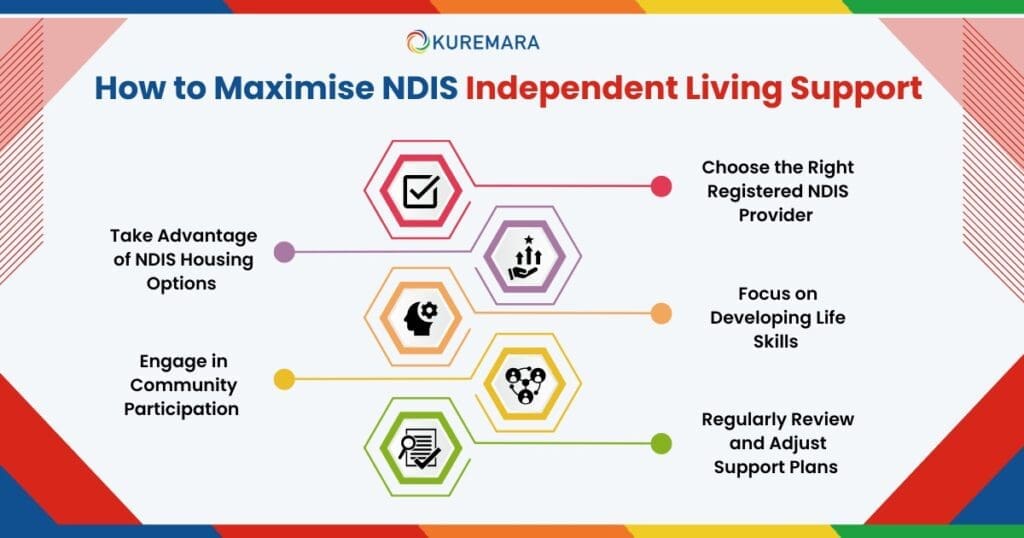
1. Choose the Right Registered NDIS Provider
Choosing the right-registered NDIS provider is one of the most critical steps in making any progress over NDIS living support. The standard and character of care and services that one receives mostly depend on a trustworthy provider. The best provider should be able to offer a wide range of services, have a good reputation, and take a personalised approach with regards to support.
All registered providers of NDIS also adhere to strict standards; this, therefore, ensures that participants receive high-quality and compliant service. A participant would thus need a provider that is well conversant with the needs and goals of an individual participant to ensure positive outcomes in independent living.
2. Take Advantage of NDIS Housing Options
It will make them lead an independent lifestyle where they will be able to live in suitable accommodation and be safe. In identifying possible housing options, factors which may feature are the location of the accommodation, accessibility features, or on-site support services. Accessing NDIS housing can significantly enhance a participant’s capability to lead an independent life safely and in a supportive environment.
3. Focus on Developing Life Skills
The skill development in practical living skills forms the fundamental part of independent life. Building the skills for NDIS supported independent living services will involve preparation of meals, cleaning, budgeting, and everything about the public transport system. In fact, participants will gradually build up their independence from support workers as they develop more practical living skills.
Participants should collaborate with the NDIS providers to establish what their specific skills they would develop overtime with time and therefore come up with a strategy for building those skills. It must be systematic so that it does not overwhelm the participant but rather creates confidence with every new skill before moving on to the next one.
4. Engage in Community Participation
Independent dwellers often keep themselves busy through various community activities. Social intercourse, volunteering, or education helps in building social relations, improving mental wellbeing, and enhancing life skills. This promotion of participation in community activities, despite reducing isolation being powerful, helps to further and strengthen a lifestyle that is more independent and livelier.
You can explore all community programs available through NDIS and find activities that interest and assist participants in making progress toward their goals. Activities that promote participant growth and skill development are most helpful.
5. Regularly Review and Adjust Support Plans
This will mean that over time, while participants acquire more independence, support plans should be reviewed and adapted accordingly, taking into consideration the regard for ensuring that the support being provided is commensurate to their needs and additionally allows for a gradual adjustment of assistance.
An effective NDIS support plan should be flexible and responsive to change whenever the participant’s situation changes. Regular reviews with the NDIS provider will ensure that at all times, participants receive the right level of support to maximise their independence.
NDIS Supported Independent Living Tips for a Better Experience
Focus on Tailored Support
For NDIS supported independent living, tailored support is required for maximum benefit. Participants have to closely work with their providers to collaborate and develop a support plan according to their needs, goals, and abilities. This is where the personalised approach is of much importance so that participants get appropriate amounts of assistance in promoting independence without bringing about any sort of undue dependency on support services.
Encourage Independence at Every Step
While encouragement for support is important, support for independence must also be generated at each step. This means the gradual reduction of assistance one provides as participants build their skills and confidence. There should be such independence and self-reliance in life as providers are able to empower participants in controlling their daily routines and making decisions for themselves.
How NDIS Supported Independent Living Enhances Quality of Life
Naturally, the opportunities for independent living that NDIS brings into the lives of its participants augur well for them to enjoy a high quality of life. Participants in NDIS who are provided with the support to live independently stand to enjoy greater control over their daily lives, higher self-esteem, and a sense of accomplishment at getting a proper life. The setting and managing their own homes, decisions on their care, and involvement in their communities all go to well facilitate a more fulfilling empowered lifestyle.
The most important skills developed in SIL services-such as budgeting, cooking, and personal care-are very critical for long-term independence. As a result of increased confidence in these skills, participants have to rely less on the support workers and can better manage their lives.
Conclusion
Kuremara has changed the lives of people with disability in Australia fundamentally through its independent living. Supported independent living services, NDIS housing, and tailored support plans help participants be able to manage their lives, develop vital life skills, and live more independently. Participants can benefit from the NDIS fully and enjoy much independence by working with a registered NDIS provider and focusing on developing practical life skills.
As the NDIS continues to change, it is an important tool to help individuals with disabilities lead productive and independent lives. Most of the people who participate in this program are able to overcome the challenges, increase their self-esteem, and enjoy a higher quality of life if they become adapted, are supported with the use of the resources available, and work with providers.
 care@kuremara.com.au
care@kuremara.com.au
